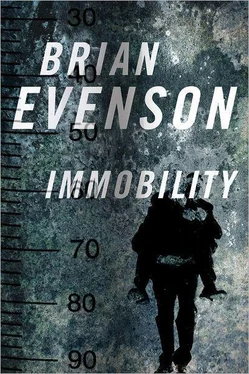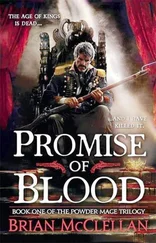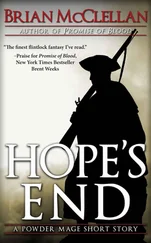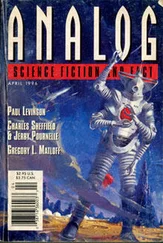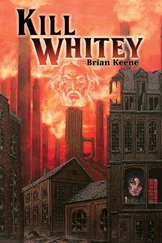“Pupil contracts,” he heard someone say. A male voice, hoarse, similar to the one he had heard earlier. “Vision’s probably okay.”
The blazing circle disappeared, its afterimage tracking across his vision and the figures resolved briefly into being. And then the thumb and forefinger let go and he saw only the inside of his eyelid again.
“What was that?” asked someone new, in a distracted voice.
None of the voices sounded familiar. Then again, why should they?
“I said,” the first voice said, louder this time, “that he’ll probably be able to see.”
“That’s not what you said.”
“ Vision’s probably okay, I said. Amounts to the same thing.”
“Have it your way,” said the other. “Hand me the hypodermic.”
Silence. And then all at once the remnants of sensation that had been eddying seemed about to burst. All his nerves burned at once. He tried to scream but nothing came out.
He lay there immobile, certain he was dying, until, mercifully, like a candle, he was snuffed out.
“HOW ARE WE FEELING?” a voice asked.
His body felt distinct, like a body again, more or less, though tender, sore all over. He willed his eyelids to open, was surprised when they obeyed. His eyes, though, took a long time to adjust. Gradually a blurred figure became distinct, human. A middle-aged man wearing a soiled white technician’s coat.
“How are we feeling?” the man asked again, smiling, perhaps two feet away from his face.
He tried to speak, but his tongue was stuck to the roof of his mouth and wouldn’t move. He grunted.
The technician squinted and brought his face closer, his eyes lost in a web of wrinkles. Then his face relaxed, grew smooth.
“You’ll have to forgive me,” the technician said. He reached down, came back up with a bottle of something, a long glass tube running out one end of it. “You’ll have to excuse me,” he said. “It’s been a long time since we’ve unstored someone.”
The technician forced the tube into his mouth. He felt it scrape against his lips, then burrow its way in between his palate and his tongue. It felt like layers of tissue were being torn off. Something was seeping out of the tube, a liquid of some sort, slightly bitter to the taste. Slowly, his tongue loosened, then became independent of the vault of the mouth. The liquid trickled its way deeper into his mouth, down his throat, down his windpipe as well. For a moment, he felt he was choking. He began to cough.
The technician withdrew the tube, helped him to turn his head to the side until the liquid had oozed out and the coughing had stopped. A strand of the fluid hung, black and ropy, from one corner of his mouth.
“There now,” said the technician, wiping it away. “All better.”
“Hardly,” he muttered.
His voice was cracked, his vocal cords having difficulty making the right sounds. The technician looked at him quizzically. He cupped his ear with one hand and leaned in. “You’ll have to repeat that,” he said.
“Who am I?” he asked.
The technician drew back. “Who are you?” he asked. “Yes, I should have asked that—part of the procedure, just to make sure you came out all right. So, yes, who are you?” the technician asked, and waited.
He shook his head. It felt like his brain was sloshing against the sides of his skull. “No,” he said, his voice a little firmer now. “I’m asking you to tell me.”
“Who do you think you are?”
“I don’t know,” he said.
“I’ll give you a hint,” claimed the technician. “I’ll give you the first letter.”
“Just tell me,” he said.
“You start with an H, ” said the technician, leaning closer, rubbing his hands. “It’s better this way. It needs to come back to you on its own. That’s in the manual.”
“Just tell me,” he said again.
“After H, the next letter is—,” the technician started to say to him, but by that time, almost without him knowing it, his hands had found their way to the technician’s throat and were squeezing, the man’s face darkening.
What am I doing? he wondered in amazement, and let go.
The technician stumbled backwards, hacking and coughing, until he slammed into the wall and slid slowly down.
“My name,” he said again.
“Hork eye,” the technician gasped.
Horkai, he thought. Yes, that sounded right. Plausible, at least. Close enough, anyway. For now.
* * *
THE TECHNICIAN STAYED pressed against the far wall, rubbing his throat, regarding him warily. Horkai had managed to prop himself up on his elbows, but it hadn’t been easy. With each movement he’d been struck by a new burst of pain, the last one so bad he had nearly passed out.
He was on a table. Plastic or plasticine, sturdy and long. Why can I remember what a table is when I can’t even remember my own name? he marveled. He brushed the tabletop with his fingers lightly, feeling its dimpling, but even that simple sensation was almost too much to bear.
In a moment, he told himself, once I’ve gathered myself, once I feel okay, I’ll swing my legs off the table and stand up. Only not quite yet.
“You could have killed me,” said the technician, his face pale and appalled.
“I’m sorry if things got out of hand,” said Horkai. “I didn’t mean to hurt you.”
“If you didn’t mean to hurt me, why were you strangling me?”
Horkai closed his eyes. He shrugged, then winced.
“You’re dangerous. They were right to store you,” said the technician. “But they weren’t right to wake you up.”
Horkai didn’t bother to respond. “Tell me where I am,” he said.
“You’re here,” said the technician. “Where you’ve always been.”
“Where’s here?”
The technician didn’t answer.
“Shall I come over there and make you answer?” asked Horkai.
The technician smirked. “Empty threat,” he said. “Even I know you can’t manage that.”
Horkai pressed his lips together. Carefully, he rocked his weight onto one elbow, shifting from the opposite elbow to his hand. The pain made him groan. He rocked the other direction, forced himself onto that hand as well.
The technician looked worried. “I wouldn’t do that if I were you,” he said.
Horkai ignored him. He tested his arms. They were both weak, atrophied, but would, he thought, support him. He gathered his weight on his arms, swung his legs and body out off the table.
Only his legs wouldn’t hold, wouldn’t move at all, in fact. They splayed and collapsed, and his forehead glanced off the table next to his own just before he struck the floor hard, pain shooting through his ribs and hip.
He lay there on the floor, staring at a brushed metal table leg. He reached up and touched his head, brought his hand away and saw fingers grown slick with blood.
“You’re paralyzed, Horkai,” the technician said. “A paraplegic. Don’t you remember?” Horkai turned and saw that the technician was now standing. “I’d help you up,” the man said, “but I’m afraid to get close to you.” And then he left the room.
* * *
HE PATTED HIS FOREHEAD. As far as he could tell, the gash was not bad. The bleeding seemed to have stopped almost immediately. Indeed, after a moment, he had a hard time telling where exactly the gash itself was.
He pulled himself up to sit, still feeling pain deep within each movement, and straightened his legs as best he could. Then he lay back again and began to think.
What did he know? Very little. He had been stored—he knew that somehow, knew what that meant, but could not for some reason remember where he had been stored or why. Nor why they, whoever they were, had unthawed him. He knew his name, Horkai, or at least a name that sounded plausibly like it could be his own. He knew, looking at his arms, that for some reason his skin was exceptionally pale. He knew, looking at his body and running his hand over his head, that he was hairless, and remembered, or thought he remembered, losing his hair in a blast. There was a name for it, for the blast, or for the thing the blast had been part of, something he could remember: Kollaps. Why had that come to him seemingly more naturally than his own name? He could remember something about the Kollaps itself but very little about what he had done before or what he had done after, in the days just before being stored.
Читать дальше
